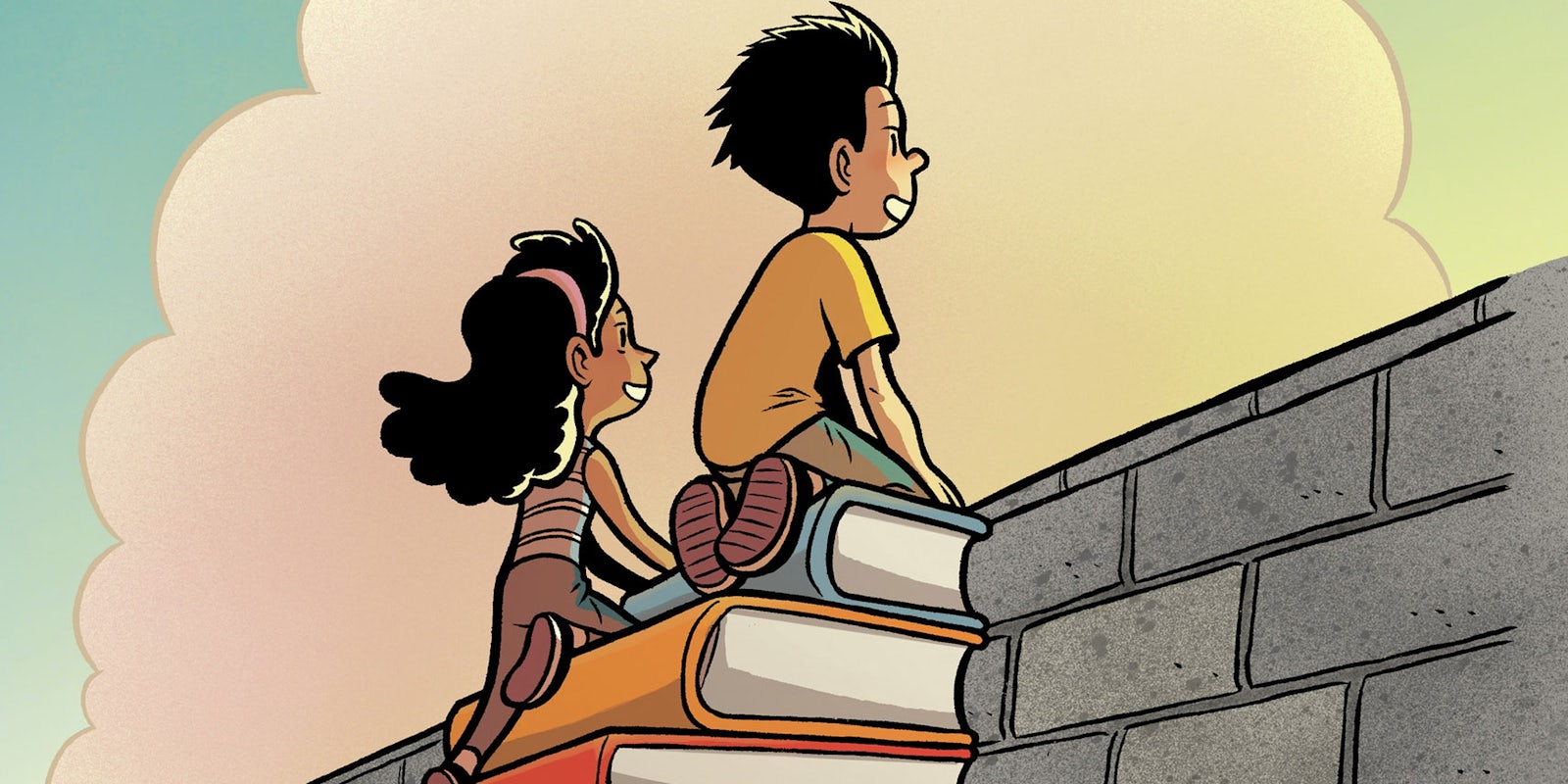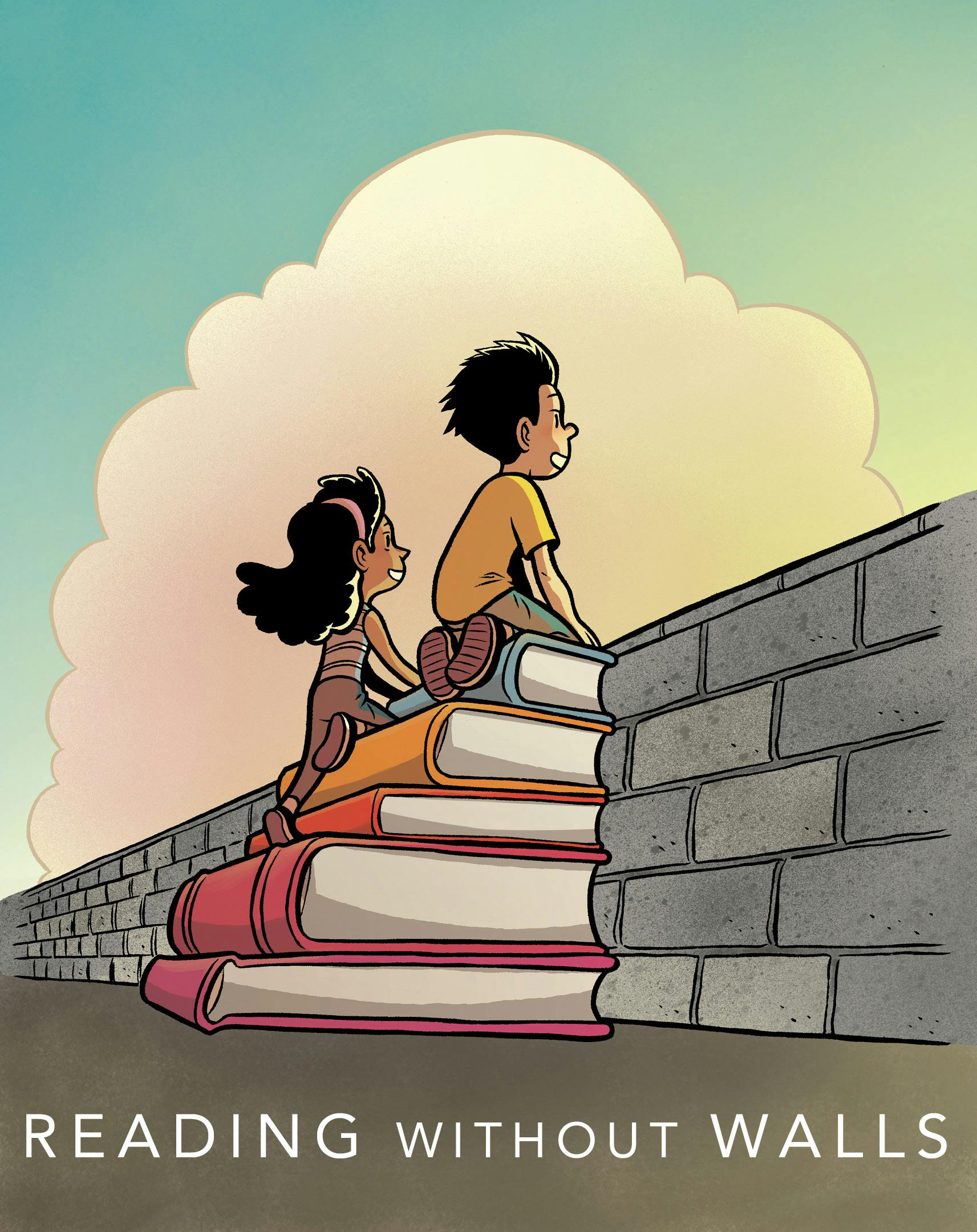It’s a good time to be a kid who likes to read. As geek culture steadily moves into the mainstream, kids have more and more opportunities to explore different kinds of literature.
Thanks to the convergence of genres and formats, mainstream children’s literature means more things to more people than ever—and Gene Luen Yang is at the forefront of the movement making it happen.
Ever since his young adult novel American Born Chinese became the first graphic novel to be nominated for a National Book Award, Yang has spent a decade making a case for children’s and teen literature and comic books as high art—mediums that are still derided by some today. After finishing an acclaimed, Eisner-winning stint as writer for the graphic novel series based on Avatar: The Last Airbender, Yang took up the mantle of writer for DC‘s Superman.
“It’s been a crazy year,” Yang told the Daily Dot in a phone interview. “If you’d told me this time last year that all these things would happen, I would not have believed you.”
Recently, Yang was appointed the National Ambassador for Young People’s Literature—a role previously held by children’s lit legends like Katherine Paterson and the late Walter Dean Myers. The position is chosen annually by a joint committee from Every Child a Reader (ECAR), the Children’s Book Council, and the Center for the Book in the Library of Congress.
“I was excited and scared, too,” Yang laughs when describing his reaction to the appointment and his sense that he was standing on the shoulders of giants. “Oh, my god. All of them! Jon Scieszka, Katherine Paterson, and of course Walter Dean Myers, are all huge, enormously influential authors.”
Yang says the mission of the position is “to get more kids reading and get kids reading more.” He has exciting ideas about where to start.
The idea of “Reading without Walls,” a theme Yang chose for his year as ambassador, touches on numerous fronts that are close to his heart, as well as to his publisher, First Second Books, the graphic novel press that took a chance on American Born Chinese a decade ago. Yang has published with the press ever since.
They asked me to think of a theme, or rather a platform. And ‘Reading without Walls,’ the phrase itself came out of a meeting I had with the Childrens’ Book Council and First Second Books. And I think where I fit in particular and where First Second fits in general in the book market, we fit in between these different places that have traditionally been divided by [publishing] walls, right. Traditionally comics and books have been seen as these two separate entities, in two separate industries, each with its own distribution system, each with its own rewards, each with its own stores. But now that wall in-between has been breaking down, and I really feel like I’ve been a beneficiary of that wall breaking down. So I wanted to talk about that.
And First Second is also in-between cultures, too. First Second Books are published is published in the American market, but most of them are full color, the way they are in the European market, and they’re published in a size that’s much closer to the local market.
Yang told the Daily Dot that the idea of convergence culture—of various subcultures and communities merging and becoming conversant with each other—is also important to the theme of breaking down walls.
“What we as a culture see as high art versus low art is really in flux. The kind of movies that get nominated for Oscars, some of them are genre movies that probably wouldn’t have been considered high art even a couple of decades ago.”
For comics fans, that can only be a good thing. “I think it’s really exciting. I read these interviews about Stan Lee, and he talks about how the reason why he didn’t use his legal name on the comics, Stanley Lieber, was because he wanted to eventually become a novelist, and he was initially ashamed of being a comics writer, so he went for a pseudonym. And I don’t think anyone thinks that way anymore.”
Yang describes working on Superman as “an awesome journey” and tells the Daily Dot he’s excited for what’s to come. With comics creator Noelle Stevenson rounding out 2015 as another National Book Award nominee for her graphic novel Nimona, it’s a good time for that corner of the industry—but he recognizes there is more work to be done.
“I think I have certain levels of privilege I have to confront. I’ve always felt like comics were a safe place. I’ve always felt like it’s been an outsiders’ medium. It’s only recently only [because] women have become outspoken online that I’ve realized it is not welcoming to all outsiders.” When asked about the recent exclusion of women by comics’ prestigious Angoulême prize, he laughs and hedges, “I don’t even know what to say about that.”
“There are definitely corners of the book market that are more friendly to girls,” Yang acknowledges. “And I think the comics corner needs to learn from those other ones.”
A piece of the solution is empathy. I think encouraging people to read about others who aren’t like them, and I think especially encouraging boys to read about girls is important. You see girls wearing Superman and Batman T-shirts all the time. You almost never see boys wearing Wonder Woman. I think heroism in any form should be celebrated.
“Basketball is kind of like comics—it’s where outsiders can go and congregate.”
How, then, is Yang preparing to apply his love of genre fiction and the medium of comics to his role as an ambassador? He says that when it comes to children’s literature, the realms of fantasy and science fiction offer an important way to approach major ideas—especially when those ideas are too difficult to confront head-on:
I think a lot of times when you approach issues directly they’re so emotionally charged that it’s difficult for you to think clearly about them, and one of the things fantasy does is give you that distance. You’re not talking about your world, it’s another world, and you can play issues out in that other world and not be clouded by your own emotional preconceptions. I think the best fantasy writers and the best science fiction writers are talking about our own world, but they’re doing it in a very clear way because they’re doing it in another world.
For Yang himself, modes of fiction have been a way of examining his own multicultural heritage. Regarding his own seminal work, American Born Chinese, Yang notes that it was “about me exorcising my demons. It was me exorcising some shame that I had around my own cultural heritage, and figuring out a way to integrate the Eastern and Western halves of myself.”
“And I think more and more that happens for our kids, right? Fewer and fewer of our kids are growing up in monolithic cultures. So they have to figure it out.”
He adds that geek literature and geek culture is also often a way to help kids grow into adulthood. Before his writing career took off, Yang taught high school science for 17 years. He recalls how a quiet student’s relationship with the role-playing game Everquest illustrated to him how valuable it can be for young people to explore themselves in the realm of fantasy.
He was a guild leader in Everquest, and he told me that his guild had these 30-year-old dudes who were following his orders in this fantasy environment. And when he talked about being a guild leader, he was no longer a high school kid—he was a guild leader. He had a confidence that he didn’t normally have in my class.
And as he got older I saw that he was able to bridge some of the stuff that he’d developed in this fantasy environment into his real life. By the time he was a senior he had the same confidence in his real life that he did in his online life. I think that’s one of the powerful things about fantasy—it can help you work out some of your issues, and help you grow, in a safe fantasy environment.
Yang hopes that through his role as ambassador he can get kids “reading and excited about books.” After that, “hopefully as they get older they’ll remember with high esteem the books they loved as kids.”
In the meantime, Yang is busy writing more graphic novels. Following the success of 2013’s YA title Boxers and Saints, he’s returning to his love of science. “I’m working on a series right now called Secret Coders, which is illustrated by a fabulous artist named Mike Holmes, and it’s a series that teaches kids the fundamentals of computer programming. And then there’s a second book that we don’t even have a title for yet. I’ve only written the prologue and the first chapter. But it’s about basketball.”
It’s my first non-fiction book, so I followed a group of kids for a season. I’m trying to model it a bit after Friday Night Lights, the book, not the TV show. So I want to talk a little bit about the history of basketball, how it intersects with culture, as I talk about the team.
I interviewed them looking for a story. I traveled with them, I went to tournaments, it was really fun. I’ve never been a fan of basketball, and even now I’m definitely no basketball expert, but I know enough now to understand why people like it—to get the cultural significance of basketball. Basketball started in the late 1800s and early on it was kind of seen as an outsider sport. If you were a school that couldn’t afford a field to play baseball or football on, you would gravitate towards basketball. So early on, the schools that were really good at basketball were the inner-city schools and the Catholic schools. And to some extent that still continues today if you look at the NCAA, the folks that end up in the finals, Catholic schools are disproportionately represented at that level. So all the way through it’s been this weird stage where cultures of outsiders play out their own dramas.
As for what comes next, Yang says he doesn’t know if he’ll continue exploring sports; when it comes to basketball he’s still learning. But he hopes that the love of reading he hopes to instill during his year as an ambassador to young readers will continue to play out in their lives—and that “reading without walls” will become a theme that lasts into adulthood.
“I’m hoping that just reading about something different from yourself, reading topics you aren’t familiar with, or reading stories in a format you’ve never tried before, will bear fruit like that. It’ll lead to new relationships and new opportunities.”
Photo via First Second Books



